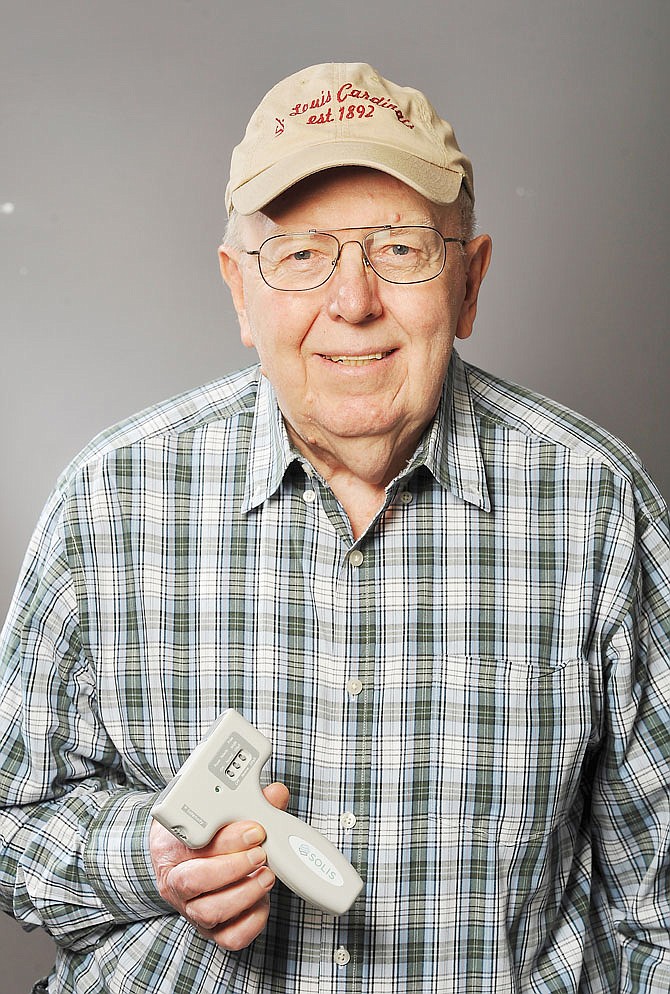Norm Schroeder's restless leg syndrome caused his leg to twitch and kept him up at night. So, he did what any enterprising retired engineer would do and used a broom handle to apply pressure to the problematic nerve.
"It was excruciating pain, but it overrode the kicking," Schroeder said. "I could sleep with the pain, but I couldn't sleep with the kicking."
Seven years ago, at the age of 73, Schroeder started his own company by jury-rigging a prototype device together out of wood and duct tape that sent small electric shocks through his leg and stopped the pain. After seven years of building prototypes and getting clearances from the U.S. Food and Drug Administration, Schroeder feels ready to sell his technology to a Los Angeles-area company - and retire again.
The broom handle approach stopped Schroeder's leg from kicking, but caused him great pain and left his legs black and blue with bruises. So he created a hand-held device that could stop the twitching by sending small electric pulses through nerves in his leg.
The idea to form a company came from his hope to help other people with restless leg syndrome.
"It kinds of burns into you after a while that I'm the only one in the world that's got this thing," Schroeder said. "There's a whole bunch of people just like me out there that are doing everything they can and lying awake at night."
His device allows patients to treat pain by pressing its flat surface on skin and muscles, which compress nerves. A pair of conductors runs a low-voltage electrical current through nerves, which overload sensation receptors and prevents pain signals from getting to the brain.
In 2014, the FDA approved the device for sale on a prescription basis. At the time, Schroeder's fledgling company sold the device under the placeholder name CP Pain Relief. Distributors of durable medical equipment marked the price of the device up to $450, Schroeder said.
"We found that at a price of $250 or $300, that's a bad market, (for Medicare patients)" he said. "This thing sold at $450 because they had to mark it up so much in order to make money. It wasn't a good business model."
In December 2016, the FDA approved the device for over-the-counter sales. Two months later, a connection of Schroeder's who worked with him while the CP Pain Relief device sold on a prescription-basis, introduced him to executives from Irvine, California-based IRIS Technology. IRIS makes military, aerospace and industrial equipment.
IRIS COO Jim Wold used the CP Pain Relief device and thought his company could bring the device to mass markets, IRIS Chief Administrative Officer Sandy Thomson said.
So, IRIS executives formed a sister company called MedDev LLC and re-named the product the SOLIS Pain Relief Wand.
Over-the-counter products must have different names than prescription devices, Schroeder said. The new name is meant to conjure up images of warmth, he added.
MedDev began selling the device for $250 online Aug. 6. In two months, MedDev will own Schroeder's company. Schroeder thinks the device can treat several conditions from regular muscle soreness to muscle knots. Thomson said IRIS' team was impressed with the way it treated chronic pain conditions easily.
"These are the type of people we like to do business with," Thomson said in reference to Schroeder. "We ended up agreeing it would be a disservice to not bring this device to people that are in chronic pain."
Unlike similar devices, the conductors on the SOLIS device are built into its hard-plastic shell. Thomson said this will keep costs down for consumers and make it easier to use.
"You don't need sticky pads, so there's no ongoing expense," Thomson said.
She said the core clientele for the product will likely be chronic pain sufferers older than age 65. After almost three weeks of availability online, Thomson said MedDev is happy with the results so far. The company expects sales to ramp-up the longer the product is on the market.
Schroeder said he has patents for the device in Canada, the European Union and India. For now, MedDev is focused on selling the product only in the U.S., Thomson said.

